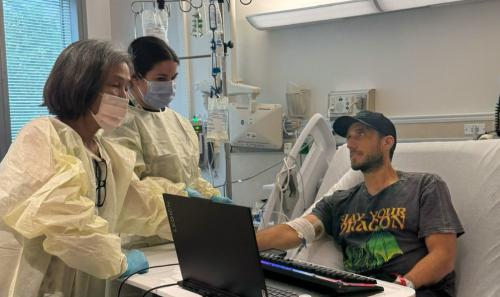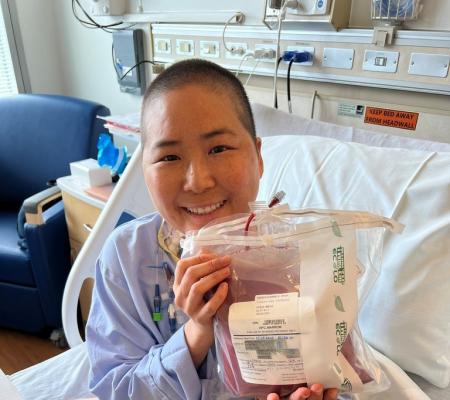
-
Understanding primary immunodeficiency (PI)

Understanding PI
The more you understand about primary immunodeficiency (PI), the better you can live with the disease or support others in your life with PI. Learn more about PI, including the various diagnoses and treatment options.
-
Living with PI
-
Addressing mental health
-
Explaining your diagnosis
- General care
- Get support
- For parents and guardians
-
Managing workplace issues
- Navigating insurance
-
Traveling safely

Living with PI
Living with primary immunodeficiency (PI) can be challenging, but you’re not alone—many people with PI lead full and active lives. With the right support and resources, you can, too.
-
Addressing mental health
-
Get involved

Get involved
Be a hero for those with PI. Change lives by promoting primary immunodeficiency (PI) awareness and taking action in your community through advocacy, donating, volunteering, or fundraising.
-
Advancing research and clinical care
-
Research Grant Program
-
Consulting immunologist
-
Diagnosing PI
-
Getting prior authorization
-
Clinician education
-
Survey research
-
Participating in clinical trials

Advancing research and clinical care
Whether you’re a clinician, researcher, or an individual with primary immunodeficiency (PI), IDF has resources to help you advance the field. Get details on surveys, grants, and clinical trials.
-
Research Grant Program
By Barbara Meade
Many of you are familiar with the shock and disbelief of finding out a loved one is diagnosed with a primary immunodeficiency disease. That’s what happened to me almost 25 years ago. After multiple skin and lymph node infections with high fevers my son, Joseph, was finally diagnosed with chronic granulomatous disease (CGD). It was confirmed by lab tests. I was a pediatric nurse at the time and had never heard of this diagnosis, let alone how to spell it. I had to have his doctor write it down for me. We didn’t know where to turn or who to contact for support and more information about this disease.
We were told, fortunately, that a doctor at Children’s Hospital in Boston was familiar with CGD and involved in interferon gamma trials (medicine given to help those with CGD). We met with this doctor to gain as much information as we could and to understand what the prognosis and plan would be. Joe immediately started on interferon gamma shots and sulfamethoxazole/trimethoprim along with other I.V. antibiotics. I was told Joe was one of only six people in New England at that time to be diagnosed with this rare disease. Needless to say, our whole family was numb with grief given this diagnosis. I wanted to connect with other patients or support groups, but I knew it would be difficult because CGD was so rare. I was advised to connect with a woman in California named Mary Hurley. She was reported as a contact who was very knowledgeable, supportive, and involved with other patients and families with CGD. With no internet to search for her back then, I found her home phone number and reached out. That was when I first began my relationship with the amazing Mary Hurley.
Mary and her husband Alan created the CGD Association in 1982 after their two sons, Erik and Stephen, were born with CGD. The CGD Association’s mission was to provide emotional support to other patients and families and to educate physicians and other organizations of the diagnosis and treatment for CGD. They created a CGD medical library and distributed informational materials, booklets and guides, and sent out a quarterly newsletter to those who requested it. I remember anxiously waiting to receive and read the next edition of this newsletter. Mary also created a patient questionnaire to gather as much information as possible on every patient she knew with CGD. It was her own and the first CGD registry.
Alan describes his wife as someone who read all she could about CGD and in turn, became an “encyclopedia” for the disease. She attended worldwide medical symposiums to learn from the leading experts in the field, and although he described her as a shy woman, the incredible drive and determination that made Mary so special was clearly displayed when it came to CGD.
My conversations with Mary always gave me a feeling of incredible relief and comfort to talk to someone who had two sons dealing with the same illness. I was always amazed at how much she knew and how much support and compassion she offered. She spent hours on the phone listening and offering guidance and support, not only to me, but to the hundreds of families she followed. Through the years, we spent quite a bit of time on the phone and connecting over email. Every time Joe got sick, which was often at times, I would contact Mary in order to get her advice on any new treatments and medications.
A few years after connecting with Mary, we both got involved with IDF. We met several times in person at the volunteer conferences that IDF sponsored, and then later at that national conferences. We both wanted to keep CGD a focus at these meetings and conferences. We looked forward to meeting up in person at these events not only to discuss CGD news and to network, but also to share what was going on in each of our own private lives. I remember her sharing stories of where she had traveled or where she would like to go on her next trip. She would also give me updates on what Erik and Stephen were involved with and how they were feeling.
Although she struggled for several years with cancer and suffered the loss of her eldest son, she never gave up trying to find a cure for CGD. With funding from the CGD Association, she donated it to support grants and research in order to find a cure. She was also an active member of the IDF Board of Trustees until she had to step down due to her illness.
The last time I spoke to Mary it was this past April. She had just come back from having a procedure to remove fluid from around her lungs. She was still looking forward to meeting up again at the IDF 2017 National Conference in Anaheim. Her family was planning on attending as well. When I heard the news a few weeks later of her passing, I was saddened. It seemed so soon after our conversation, but now I know we have a friend in a higher place. I’m sure she will continue to oversee that the cure for CGD is close at hand.
Mary, thank you for all you have done for our community. You will be missed by a great number of friends and family members in this community.
Related resources

Man with X-linked hyper IgM first-ever to receive novel gene therapy

Pharmacist with CVID receives bone marrow transplant

Undiagnosed: Reuben & Sherri Johnson on CGD, chronic illness, and the fight for healthcare
Sign up for updates from IDF
Receive news and helpful resources to your cell phone or inbox. You can change or cancel your subscription at any time.





The Immune Deficiency Foundation improves the diagnosis, treatment, and quality of life for every person affected by primary immunodeficiency.
We foster a community that is connected, engaged, and empowered through advocacy, education, and research.
Combined Charity Campaign | CFC# 66309

